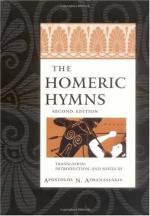[Mourning Demeter. Marble statue from Knidos. In the British Museum: lang54.jpg]
But the Cnidian shrine had once another treasure, the beautiful melancholy statue of the seated Demeter of the uplifted eyes; the mourning mother: the weary seeker for the lost maiden: her child Persephone. Far from the ruins above the sea, beneath the scorched seaward wall of rock: far from the aromatic fragrance of the rock-nourished flowers, from the bees, and the playful lizards, Demeter now occupies her place in the great halls of the British Museum. Like the Hymn, this melancholy and tender work of art is imperfect, but the sentiment is thereby rather increased than impaired. The ancients buried things broken with the dead, that the shadows of tool, or weapon, or vase might be set free, to serve the shadows of their masters in the land of the souls. Broken as they, too, are, the Hymn and the statue are “free among the dead,” and eloquent of the higher religion that, in Greece, attached itself to the lost Maiden and the sorrowing Mother. Demeter, in religion, was more than a fertiliser of the fields: Kore, the Maiden, was more than the buried pig, or the seed sown to await its resurrection; or the harvest idol, fashioned of corn-stalks: more even than a symbol of the winter sleep and vernal awakening of the year and the life of nature. She became the “dread Persephone” of the Odyssey,
“A Queen over death and the dead.”
In her winter retreat below the earth she was the bride of the Lord of Many Guests, and the ruler “of the souls of men outworn.” In this office Odysseus in Homer knows her, though neither Iliad nor Odyssey recognises Kore as the maiden Spring, the daughter and companion of Demeter as Goddess of Grain. Christianity, even, did not quite dethrone Persephone. She lives in two forms: first, as the harvest effigy made of corn-stalks bound together, the last gleanings; secondly, as “the Fairy Queen Proserpina,” who carried Thomas the Rhymer from beneath the Eildon Tree to that land which lies beyond the stream of slain men’s blood.
“For a’ the bluid that’s
shed on earth
Flows through the streams of that
countrie.”
[Silver denarius of C. Vibius Pansa (about 90 B.C.). Obv. Head of Apollo. Rev. Demeter searching for Persephone: lang56.jpg]




